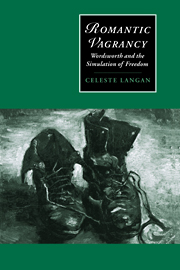Book contents
- Frontmatter
- Contents
- Acknowledgments
- List of abbreviations
- A methodological preamble
- Introduction
- 1 Rousseau plays the beggar: the last words of citizen subject
- 2 Money walks: Wordsworth and the right to wander
- 3 Walking and talking at the same time: the “two histories” of The Prelude
- 4 The walking cure
- Notes
- Works cited
- Index
- CAMBRIDGE STUDIES IN ROMANTICISM
Introduction
Published online by Cambridge University Press: 19 October 2009
- Frontmatter
- Contents
- Acknowledgments
- List of abbreviations
- A methodological preamble
- Introduction
- 1 Rousseau plays the beggar: the last words of citizen subject
- 2 Money walks: Wordsworth and the right to wander
- 3 Walking and talking at the same time: the “two histories” of The Prelude
- 4 The walking cure
- Notes
- Works cited
- Index
- CAMBRIDGE STUDIES IN ROMANTICISM
Summary
In the 1805 Prelude Wordsworth offers a retrospective account of how he decided on the form and content of the kinds of rambling stories that make up Lyrical Ballads. Rejecting books of moral philosophy, Wordsworth takes to the “public road” on which he hopes to gather an estimate of
The dignity of individual man –
Of man, no composition of the thought,
Abstraction, shadow, image, but the man
Of whom we read, the man whom we behold
With our own eyes.
(Preludexii.83–7)Why should an encounter with a stranger on the public road become the empirical paradigm of social knowledge, and the social contract? Not only is the project itself – essentially, the rendering of freedom as sheer mobilization – an historically contingent response to philosophical, political, and economic abstractions of “man”, but the poem presents this project in characteristically Wordsworthian terms. Repeating the word “man”, Wordsworth allows repetition itself to substantialize the abstraction. Indeed, the passage might fairly be paraphrased by the tautology “Man is … man.“ For even as he then proceeds to list the attributes of this positive “man,” Wordsworth can offer at best a negative litany: man is not an abstraction, not a shadow, etc. Moreover, the finally positive definition–“the man of whom we read” (87)–has an entirely recursive logic, especially in the context of Wordsworth' previous renunciation of books of moral philosophy: the man of whom we read is the word “man” of whom we read in the subsequent lines of the poem.
- Type
- Chapter
- Information
- Romantic VagrancyWordsworth and the Simulation of Freedom, pp. 13 - 30Publisher: Cambridge University PressPrint publication year: 1995
- 1
- Cited by



